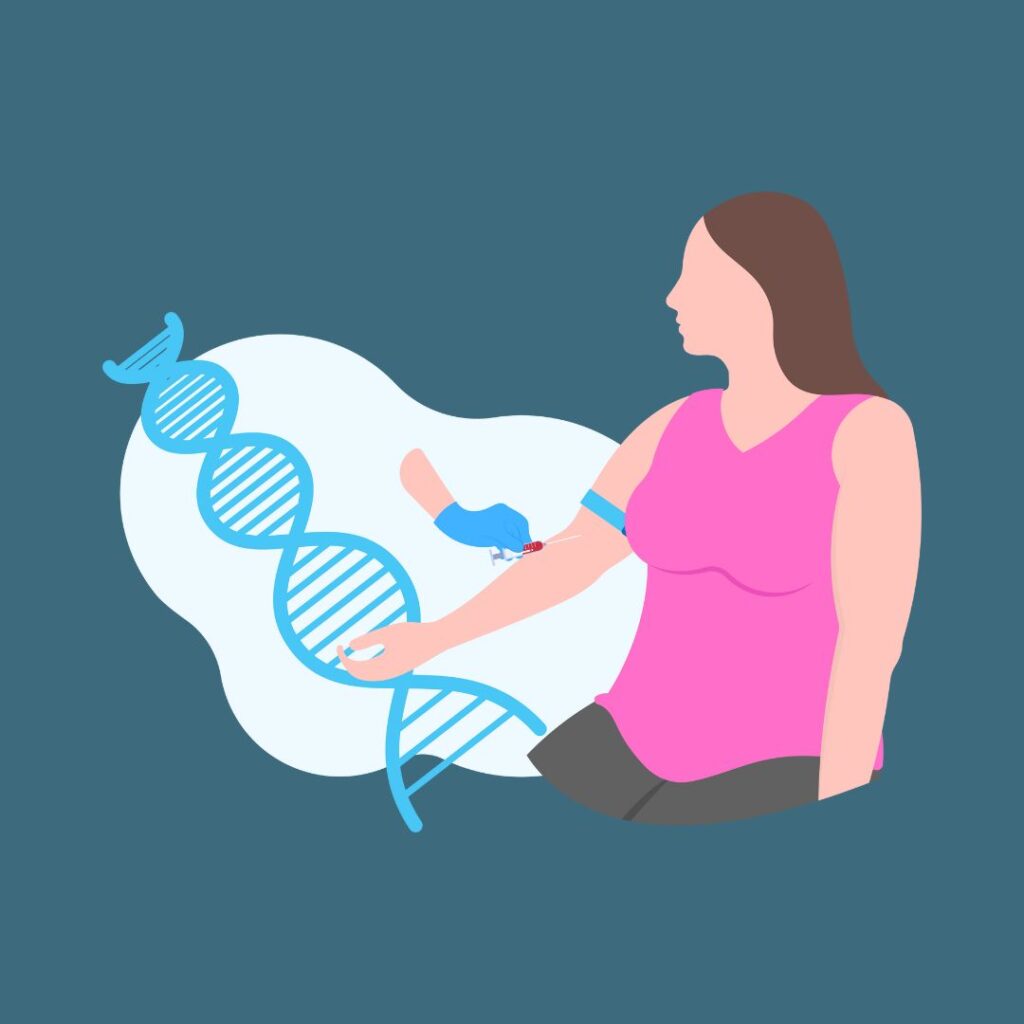Early Pregnancy Testing: The Pros & Cons

Early Pregnancy Testing: What is it exactly?
Not to be confused with determining a pregnancy, early pregnancy testing is done after a pregnancy has been confirmed, wherein a sample of your blood is taken to detect several conditions, such as gender, Down syndrome, and Trisomy.
The medical field has made great strides in early detection. Since 2012, non-invasive prenatal testing (NIPT) has revolutionized prenatal screening by providing expectant parents with a safer and more accurate method of assessing certain genetic conditions in their unborn child.
How Non-Invasive Pregnancy Testing/Screening Works
First, a blood sample is taken, usually after ten weeks of pregnancy. The blood is sent to a lab to analyze the cfDNA. The lab looks for DNA fragments from the placenta, usually identical to the fetus’s DNA. If there is more DNA than expected from certain chromosomes, it could indicate a chromosomal abnormality. The test results are usually available within two weeks.
NIPS is considered “non-invasive” because it only requires a blood sample from the mother, unlike invasive procedures such as amniocentesis or chorionic villus sampling (CVS), which can involve risks to both the mother and fetus.
What Can an NIPT Detect?

NIPTs can detect a range of conditions, including:
- Down syndrome
- Trisomy 13
- Trisomy 18
- Turner syndrome
- Klinefelter syndrome
- Triple X syndrome
- Fetal sex
- Rare genetic diseases like cystic fibrosis and Apert syndrome
Pros of NIPTs
Safety
Being non-invasive, NIPS carries no risk of miscarriage or complications associated with invasive procedures. An NIPT is done by drawing a blood sample from the mother.

Early Detection
NIPS can be performed as early as the 10th week of pregnancy. NIPS has a high detection rate for common chromosomal conditions, such as Down syndrome, trisomy 18, and trisomy 13. However, NIPS is imperfect and cannot screen for all chromosomal or genetic conditions. Positive screening results may not always be reliable, and confirmatory diagnostic testing may be needed to determine if the fetus has a chromosomal abnormality.11
Gender Determination
NIPTs can also provide insights into the sex of the baby. It looks for pieces of the male sex chromosome in your blood, which can be used to determine whether you’re carrying a boy or a girl. (If you’re having the test, tell your healthcare provider ahead of time whether or not you want to know the sex of your baby.)2
Cons of NIPTs
Accuracy and False Testing
NIPS is a screening test, not a diagnostic test, which is generally used to more definitively confirm or rule out a suspected genetic abnormality. The accuracy and performance of NIPS tests have not been evaluated and these tests can give false results, such as reporting a genetic abnormality when the fetus does not actually have one.3 If NIPS indicates an increased risk, a diagnostic test like amniocentesis or chorionic villus sampling (CVS) is recommended to confirm the diagnosis.
Not FDA-Approved
The U.S. Food and Drug Administration (FDA) is warning patients and healthcare providers about the risks of false NIPS as they can sometimes show a high risk for a genetic abnormality even when the baby doesn’t have one. The FDA is concerned that some laboratories may overstate the accuracy of NIPS tests. There have been reports that patients and healthcare providers have made critical healthcare decisions based on results from these screening tests alone and without additional confirmatory testing, such as terminating a viable pregnancy.
Cost and Insurance Coverage
NIPS can be expensive, and insurance coverage may vary. Most health insurance covers most (if not all) of the cost. Many cover at least a portion. Check with your insurance provider before testing to be sure. You can pay for the test if you don’t have insurance or your insurance doesn’t cover NIPT tests.4
If you are interested in NIPS, check with your insurance provider about costs.
Is Non-Invasive Prenatal Testing Right For You?
Non-Invasive Prenatal Testing represents a significant advancement in prenatal care, offering expectant parents an opportunity to gain insights into your baby’s health with minimal risk. However, it is essential to consult with healthcare providers to understand the implications of the results fully and to make informed decisions regarding your pregnancy journey.
Also, note that NIPTs are completely optional, meaning you do not have to undergo this screening during your prenatal care. NIPS may expand its capabilities as technology and research evolve, further enhancing prenatal care and genetic understanding.
Footnotes:
- https://www.fda.gov/medical-devices/safety-communications/genetic-non-invasive-prenatal-screening-tests-may-have-false-results-fda-safety-communication#:~:text=Published%20studies%20also%20strongly%20support,not%20confirmed%20as%20Down%20syndrome ↩︎
- https://www.babycenter.com/pregnancy/health-and-safety/when-and-how-can-i-find-out-my-babys-sex_20004784 ↩︎
- https://www.pennmedicine.org/updates/blogs/womens-health/2012/august/screening-for-down-syndrome#:~:text=Screening%20for%20Down%20syndrome%20can,multiple%20marker%20serum%20screening%20test ↩︎
- https://my.clevelandclinic.org/health/diagnostics/21050-nipt-test ↩︎

